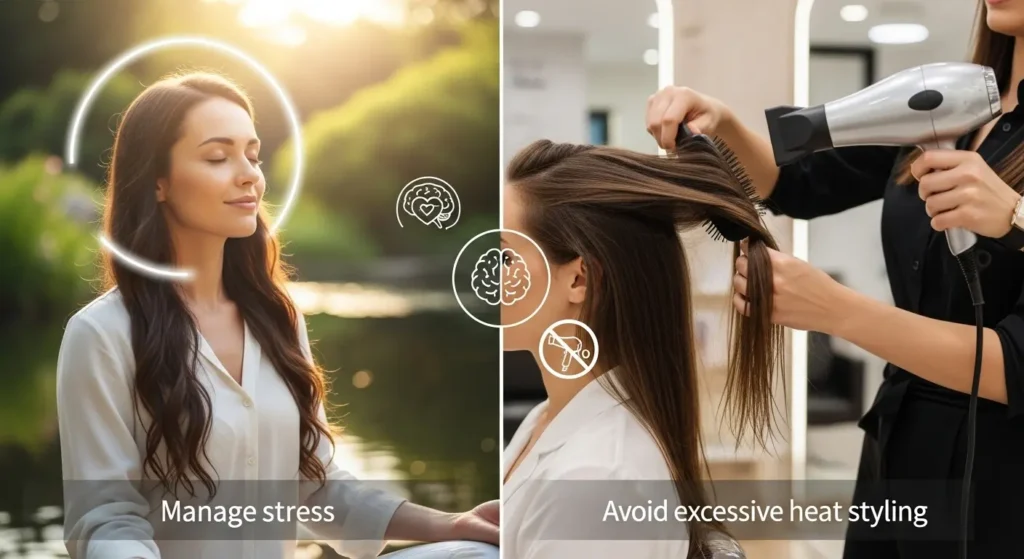Summary
This article explores the potential link between fluoride exposure and hair loss, focusing on how fluoride may affect thyroid function, which can lead to hair thinning.
While moderate fluoride exposure is generally safe, individuals with thyroid issues or high fluoride exposure may be at higher risk.
The article provides tips to reduce fluoride exposure and maintain healthy hair, alongside expert opinions and FAQs. It emphasizes the importance of consulting healthcare providers if fluoride-related hair loss is suspected.
Introduction
If you’ve ever wondered, “Can fluoride cause hair loss?” you’re not alone. Many individuals are concerned about the potential link between fluoride exposure and hair thinning. Fluoride, commonly found in drinking water and dental products, plays a vital role in oral health.
However, its effects on hair health are often questioned. In this article, we’ll dive into the science behind fluoride and hair loss, provide expert opinions, and offer tips to safeguard your hair. Keep reading to understand the potential risks and learn how to protect your scalp and hair from fluoride exposure.
Understanding Fluoride: What It Is and How It Works

What Is Fluoride and Where Is It Found?
Fluoride is a naturally occurring mineral commonly found in water, soil, and certain foods. It’s most famous for its use in dental products like toothpaste and mouthwash, where it helps prevent tooth decay by strengthening tooth enamel. Additionally, fluoride is often added to public water supplies to help improve dental health in communities.
You can encounter fluoride in various forms, such as:
- Drinking water: In many countries, fluoride is added to municipal water supplies to improve dental health.
- Toothpaste and mouthwash: Most commercial dental care products contain fluoride to fight cavities.
- Dental treatments: Dentists often use fluoride varnishes and gels to help prevent tooth decay.
How Fluoride Affects the Body: A General Overview
Fluoride is absorbed into the body primarily through ingestion and topical application. When consumed in small, controlled amounts (as in fluoridated water), fluoride can help strengthen teeth and bones. However, excessive fluoride exposure can lead to a condition known as fluorosis, which can affect both teeth and bones, and in some cases, may even contribute to health problems like hypothyroidism, which could indirectly affect hair health.
Can Fluoride Lead to Hair Loss? The Science Explained
Understanding the Connection Between Fluoride and Hair Follicles
The idea that fluoride might cause hair loss centers around its potential impact on the thyroid gland. The thyroid is responsible for regulating various body functions, including hair growth. Fluoride exposure has been linked to thyroid dysfunction, which could, in turn, affect hair health.
Some studies suggest that high levels of fluoride may interfere with thyroid function, leading to an underactive thyroid (hypothyroidism). Symptoms of hypothyroidism include hair thinning, dryness, and hair loss. However, it’s important to note that the link between fluoride and thyroid dysfunction is still being researched, and conclusive evidence is limited.
Fluoride Toxicity: Can It Be the Root Cause of Hair Loss?
Fluoride toxicity occurs when an individual is exposed to higher-than-recommended levels of fluoride over an extended period. In severe cases, this toxicity can lead to symptoms such as bone pain, dental fluorosis, and potential thyroid dysfunction. Since hypothyroidism is one of the conditions that can cause hair loss, excessive fluoride exposure may be one of the contributing factors to thinning hair.
That said, it’s essential to understand that the majority of fluoride toxicity cases are rare and occur in areas with naturally high fluoride levels in the water or through excessive use of fluoride products.
Factors That Could Increase the Risk of Hair Loss from Fluoride
Pre-existing Conditions and Sensitivity to Fluoride
Some individuals may be more sensitive to fluoride, and those with pre-existing conditions may be at higher risk for experiencing adverse effects, including hair loss. Conditions such as hypothyroidism and autoimmune diseases can increase the likelihood of hair thinning when exposed to excessive fluoride.
Additionally, those with compromised kidney function may struggle to process fluoride efficiently, leading to an accumulation of the mineral in the body. This can further exacerbate the risk of toxicity and potential health issues like hair loss.
High Fluoride Exposure: How Much Is Too Much?
The level of fluoride exposure required to cause noticeable side effects like hair loss is still a topic of debate. According to the World Health Organization (WHO), the maximum safe level of fluoride in drinking water is 1.5 mg/L. Long-term exposure to fluoride concentrations higher than this could potentially lead to toxic effects. However, it’s important to note that most public water systems maintain fluoride levels well below this threshold, and fluoride toxicity from water alone is extremely rare.
How to Protect Your Hair from the Potential Side Effects of Fluoride
Reducing Fluoride Exposure: Practical Tips
If you’re concerned about fluoride’s potential impact on your hair health, there are several steps you can take to reduce your exposure:
- Switch to fluoride-free toothpaste: Many toothpaste brands now offer fluoride-free options.
- Use a water filter: Consider installing a fluoride filter for your home’s water supply to reduce fluoride levels in drinking water.
- Opt for bottled water: If your local water supply contains high fluoride levels, consider using bottled water with low or no fluoride content.
Maintaining Healthy Hair: Essential Nutrients and Practices
Even if fluoride exposure is a concern, it’s crucial to maintain a healthy diet and hair care routine to support your hair’s health. Some tips to keep your hair strong include:
- Ensure adequate nutrient intake: Foods rich in vitamins like biotin, vitamin D, and omega-3 fatty acids can help promote healthy hair growth.
- Avoid excessive heat styling: Hair dryers, straighteners, and curling irons can cause hair damage and breakage, so try to minimize heat styling.
- Manage stress: Stress can contribute to hair loss, so practicing relaxation techniques like meditation or yoga can support overall well-being.

Frequently Asked Questions (FAQs)
Does Fluoride Cause Hair Loss in Children?
While fluoride is beneficial for dental health, excessive fluoride exposure in children can lead to dental fluorosis, which affects the appearance of teeth but not typically hair. However, children with pre-existing thyroid conditions should avoid high levels of fluoride exposure.
Can Drinking Fluoridated Water Affect My Hair Health?
The typical fluoride levels in public drinking water are safe for most individuals. However, if you’re concerned about fluoride’s potential impact on hair health, you may consider using a water filter or drinking bottled water with low fluoride content.
How Can I Tell If Fluoride Is Causing My Hair Loss?
If you suspect fluoride is contributing to your hair loss, it’s crucial to consult with a healthcare provider. A doctor can test for thyroid dysfunction and assess your fluoride exposure levels to help determine the cause of your hair thinning.
Is There a Safe Level of Fluoride Exposure?
Yes, the World Health Organization recommends a maximum fluoride level of 1.5 mg/L in drinking water. Most public water systems adhere to this guideline, and fluoride exposure at this level is generally considered safe.
Conclusion
While fluoride exposure is essential for dental health, excessive fluoride levels can potentially contribute to hair loss through thyroid dysfunction. If you are concerned about the effects of fluoride on your hair, reducing exposure through simple steps such as using fluoride-free toothpaste or filtering your drinking water can help mitigate risks.
Concerned about fluoride exposure and its effects on your hair? Book a consultation with Dr. Rana Irfan in Islamabad today to learn how to protect your hair and ensure a healthy scalp. Together, we can assess your exposure, evaluate your hair health, and create a plan to support your hair growth and well-being.
